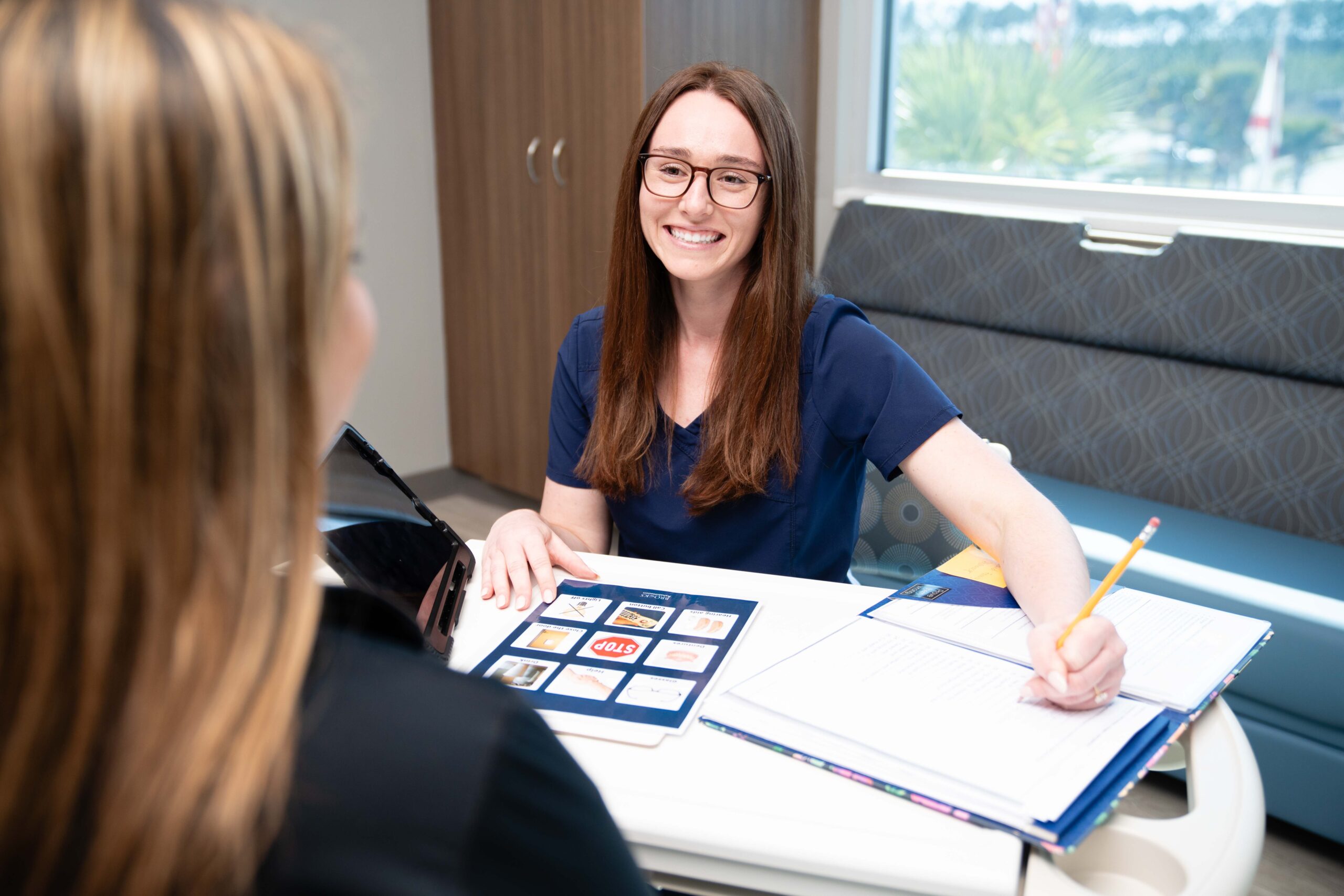Our approach
Our speech-language pathologists (SLPs) use the latest evidence-based speech, language and swallowing treatment techniques to ensure patients reach the highest level of recovery possible.
Patient care starts with an evaluation. The evaluation involves an interview, testing and clinical observation. After testing, our speech therapists establish a baseline for the patient and present areas for improvement, working with them and family to set a plan of care and improvement goals.
Treatment goals
Our goals for patients after they complete therapy are that they can safely utilize strategies and techniques independently or with minimal assistance outside of the clinic, and confidently maintain their level of communication, swallowing skills, cognitive abilities and vocal quality in various scenarios of daily life.

Find expert speech-language pathologists near you
We have several outpatient clinics and home health care clinicians to provide you with speech therapy throughout the greater Jacksonville, Fernandina, St. Augustine, Daytona, Orlando and Tampa regions.
Speech disorders we treat
Our expert SLPs treat a wide variety of speech and swallowing disorders in kids, teens and adults. Our clinicians are trained in the latest evidence-based treatment techniques in order to treat a multitude of conditions, including stroke, brain injury, cancer, neurological diseases, developmental delays and more.
Aphasia/communication disorders
Aphasia therapy consists of various language treatments to improve the patient’s ability to talk, understand, read and write more effectively. We educate the patient and caregiver on ways to decrease communication barriers and improve overall communication skills.
Cognitive therapy
Cognitive therapy consists of various activities and strategies to improve a patient’s attention, executive functioning, organization, memory, orientation and visuospatial skills. This type of therapy improves a patient’s ability to manage activities of daily living (i.e. making financial decisions, medication management).
Swallowing disorders
Swallow therapy consists of various exercises, techniques, strategies and diet modifications. We educate the patient and caregiver on ways to minimize the risk of aspiration (choking) so that the patient can safely reach his/her least restrictive diet and maintain a good quality of life.
Motor speech disorders
We offer motor speech disorder treatments at select outpatient clinic locations and home health services. This therapy helps address the motor functions of speech after a brain injury or stroke.
Neurological speech and language therapy
Speech-language therapy can be helpful for individuals who experience new or longstanding difficulties with communication, cognition, voice, speech, and swallowing as a result of changes in the brain, such as brain cancer, brain injury, stroke, and/or degenerative conditions (Parkinson Disease, Dementia, ALS, Primary Progressive Aphasia).
Cancer speech and language therapy
For individuals embarking on radiation therapy for oral, head and neck cancer(s), SLP services can help to manage common changes in swallowing that occur early on in radiation therapy and/or later on into survivorship.
Pediatric speech and language therapy
Pediatric speech and language therapy looks at different areas of communication, including receptive and expressive language, articulation, fluency (stuttering), feeding and swallowing, and pragmatics for children 0-18.
Voice therapy
Voice therapy consists of various exercises, techniques and behavior modifications. These activities are developed to improve a patient’s vocal quality so that they can be heard and understood in a variety of environments.
Do you need speech therapy?
If you or your loved one is experiencing difficulties in speaking or swallowing, obtaining a speech therapy evaluation can help determine treatment.
Some signs include difficulties with:
- Speaking clearly
- Understanding language
- Reading
- Writing
- Swallowing
In addition, if coughing, choking, difficulty with how voice sounds or projects, memory difficulties in communication or slurred speech are present, an evaluation from an SLP can help.
Benefits of speech-language therapy
Speech therapists help patients speak more clearly and fluently, understand/use language more efficiently, improve vocal quality, increase swallow safety and enhance their cognitive skills for a better quality of life.
Frequently asked questions
Patients will need a referral from their physician before starting speech therapy. Once obtained, patients can schedule their initial evaluation at the clinic that best offers the services necessary for their recovery. However, at our Aphasia Center and in our community programs, you do not need a referral.
The first appointment with a speech-language pathologist is the initial evaluation. The evaluation involves an interview, testing and clinical observation. An SLP will ask various questions about the patient’s medical history, complaints and ultimate goals for therapy.
Then, the therapist administers tests to establish a baseline and determine areas of improvement. Based on the interview responses and the performance on the tests, the therapist develops a plan of care and goals for that patient.
Next, we schedule the patient for the recommended appointments. During the follow-up appointments, the therapist educates the patient on their goals, plan of care and discusses strategies and techniques that are helpful for the patient to utilize. The therapist also develops various tasks/activities for the patient to perform throughout their future sessions to help reach their goals.
A speech-language pathologist is an American Speech-Language-Hearing Association (ASHA)-certified specialist at Brooks who treats pediatric patients and adults in the areas of voice, swallowing, cognitive therapy, language therapy, motor speech and more. They are passionate therapists who provide quality care in Brooks’ patient-centered continuum of care.

Request care
Brooks’ system of care accepts multiple types of insurance. We partner with health care systems locally, regionally, nationally and internationally — accepting referrals from most acute hospitals and physicians.
If you have a referral from a healthcare provider, call our Patient Access Center to schedule an evaluation or fill out the form below to request a callback from a patient navigator.
Call: (904) 867-4354
Mon-Fri, 8 a.m.-4:30 p.m.
